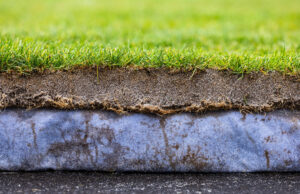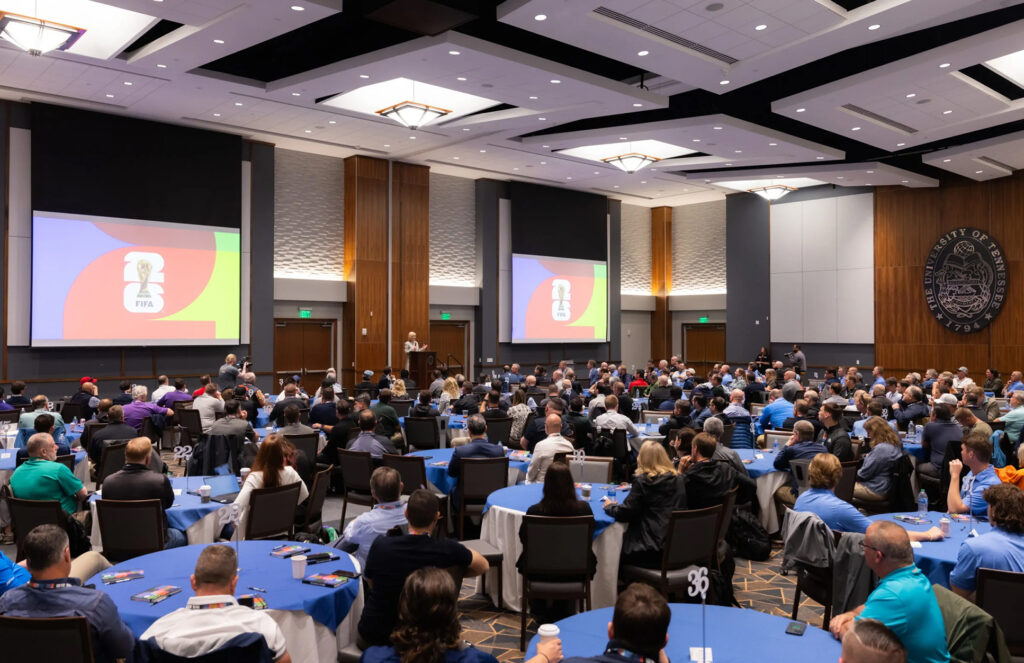A FIFA delegation visited the University of Tennessee, Knoxville, this spring as part of the FIFA Pitch Research Field Day event. The delegation inspected the turf research and development facility and met the teams from UT and Michigan State University working to create the perfect natural grass pitches for the FIFA World Cup 2026.

FIFA Chief Operating Officer Heimo Schirgi and John Sorochan, Distinguished Professor of Turfgrass Science and Management.
FIFA, soccer’s global governing body, tapped John Sorochan, Distinguished Professor of Turfgrass Science and Management, to lead the research program that supports the design, installation and management of the 16 stadium fields and dozens of training fields required for the tournament in 2026. Sorochan says FIFA’s support of UT and MSU to conduct cutting-edge research will hopefully revolutionize the sports turf industry and leave a lasting legacy for the industry after the FIFA World Cup has concluded.
“Sharing our evidence-based research with end users for the World Cup 2026 and others from around the world means everything to me,” he said. “Knowing that half of the world is watching something you have been a part of — it’s hard to imagine the emotion that I’m going to feel.”
The competition will take place in June and July 2026, with 48 teams playing across 16 cities in the United States, Mexico and Canada. The competition will stretch across four time zones and three climatic zones and conclude in New York/New Jersey.

The FIFA Pitch Research Field Day was the first official get-together of pitch managers from all 16 host city stadiums and training sites. Representatives from FIFA member associations, confederations, leagues, clubs and industry suppliers were also present as more than 200 turf specialists discussed the challenges and opportunities for the project.
When host cities and venues were announced in June 2022, FIFA’s Pitch Management Team implemented an innovative five-year research and development project to produce the perfect natural grass pitches for the tournament.
FIFA partnered with UT and MSU to deliver the largest ever sports turf research program specifically for soccer. Both Sorochan and MSU’s lead professor were involved in the pitch development program for the last North American FIFA World Cup, held in 1994.
“One of the easiest decisions I have made around this tournament so far was the partnering of UT and MSU universities,” said FIFA26 Director of Infrastructure and Technical Services Alan Ferguson. “Both already had world-leading reputations, both already led by world-leading turf professors. I didn’t want to reinvent the wheel — it was already here.”
Obstacles across the host city stadiums, training sites and practice fields include grass maintenance inside fully roofed stadiums, conversion of artificial pitches, variations in surface standards and differing grass types. The team is also testing turf for ball-to-surface interactions, athlete traction and ease of maintenance.
A state-of-the-art shade house was constructed at the UT Institute of Agriculture’s East Tennessee AgResearch and Education Center to replicate conditions inside a domed stadium, while MSU has a 23,000-square-foot asphalt pad on campus to replicate the concept of laying turf on stadium floors.
A significant benefit of the project is the invaluable opportunity it provides for UT’s undergraduate and graduate students to engage in sports turfgrass research at the highest level.

Chancellor Donde Plowman welcomes nearly 250 attendees to the FIFA Pitch Research Field Day.
Chancellor Donde Plowman said the collaboration is a prime example of what land-grant institutions like UT were created for. In her remarks to attendees at the event, she thanked FIFA for its unprecedented investment in turfgrass research and trust in UT’s experts to create the most consistent and best performing playing fields for the world’s top athletes.
“This is an incredible moment for both UT and Michigan State to collaborate on such meaningful research,” she said. “All of us at the university are grateful to work alongside so many talented collaborators and to be part of this historic World Cup. I could not be prouder to see the University of Tennessee’s name alongside the world’s most prominent athletic event.”
Keith Carver, UT Institute of Agriculture senior vice chancellor and senior vice president, remarked that the research would ultimately benefit athletes at all levels.
“The elite athletes that compete in the World Cup will play on the best surfaces, but the FIFA/UT/MSU turf research program has the opportunity to enhance the performance and even safety of playing fields for a variety of sports and athletes in cooperation with our UT Center for Athletic Field Safety. From amateur soccer pitches to Little League and high school football fields to pro golf courses, MLB and NFL fields and more, athletes at all levels will benefit from this innovative research.”
—
MEDIA CONTACT:
Tyra Haag (865-974-5460, tyra.haag@tennessee.edu)
